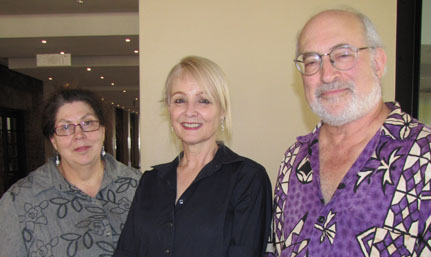Latest News Archive
Please select Category, Year, and then Month to display items
27 October 2025
|
Story Sefako Mokhosoa
|
Photo Supplied
 Ten Grade 12 learners from Mampoi Secondary School in Phuthaditjhaba.
Ten Grade 12 learners from Mampoi Secondary School in Phuthaditjhaba.
On 1 October 2025, the Projects and Innovation Directorate in the Faculty of Education at the University of the Free State (UFS) proudly hosted a certificate ceremony to honour ten Grade 12 learners from Mampoi Secondary School in Phuthaditjhaba on the Qwaqwa Campus. These learners completed a Skills Development Initiative and Workshop Series focused on digital literacy and ICT skills – a programme designed to equip rural youth with the tools they need to thrive in a digital world.
The initiative, which ran from May to August 2025, was made possible through a strategic partnership with BANKSETA to bridge the digital divide in rural communities. The learners received hands-on training in essential digital tools. Each learner also received a tablet to support continued learning and personal growth beyond the classroom.
The Director of the office in the Faculty of Education, Dr Kwazi Magwenzi, stressed that digital skills promote independence and self-directed learning. “Grade 12 is a time when learners should manage their studies, meet deadlines, and explore their options,” she said. “Digital fluency supports that autonomy. It enables learners to use online research, interactive tools, e-learning, and collaboration platforms to make learning more effective, flexible, and aligned with their pace and style. In Grade 12, where the stakes are high – with exams, tertiary entrance, and career choices – this ability helps learners become more self-directed, confident, and equipped.”
The programme not only built learners’ confidence in using ICT tools for learning and communication but also prepared them for the technologically driven environments they will encounter in institutions of higher learning.
Beyond developing digital skills, the project offered learners valuable exposure to the university environment, as their training took place on campus. Inspired by the success of this pilot, the Faculty of Education now aims to expand the initiative to reach more schools and learners across the region. The vision is to scale up access to digital education and empower more young people in rural areas with the skills necessary for academic and professional success.
This ceremony marked the conclusion of a successful training programme and the beginning of a long-term commitment to digital empowerment and lifelong learning in rural communities.
Australian academics present research seminar on education
2012-11-14
 |
At the research seminar were, from the left Prof. Marie Brennan, Prof. Melanie Walker and Dr Lew Zipin.
Photo: Amanda Tongha
14 November 2012 |
The Research Centre on Higher Education, Development and Capabilities recently hosted two international visitors, Prof. Marie Brennan and Dr Lew Zipin from Victoria University in Australia. They discussed future visits and research collaboration with Prof. Melanie Walker, Professor of Higher Education and Human Development. They presented a well-attended research seminar on ‘Educating for futures in marginalized regions: a sociological framework for rethinking and researching aspirations’.
Prof. Brennan and Dr Zipin have been involved in researching education for social justice in teacher education and higher education in Australia for many years. Most recently, they have been researchers on prestigious Australian Research Council projects. These include: (i) Capacitating Student Aspirations in Classrooms and Communities in a High Poverty Region, 2012-2014; and (ii) Pursuing equity in high poverty rural schools: improving learning through rich accountabilities, 2010-2012. They recently co-edited Re-positioning University Governance and Academic Work that was published by Sense Publications in 2010.